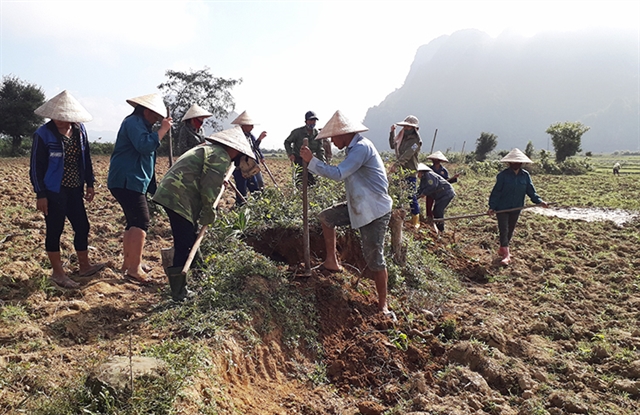 Society
Society


|
| Farmers in central Quảng Bình Province find rats in the field to kill. — Photo baoquangbinh.vn |
HÀ NỘI — The trials of the new eco-friendly, rat-specific toxin DR8 on the most destructive types of endemic rats in Việt Nam were successful, according to the Ministry of Agriculture and Rural Development’s Plant Protection Department.
The project, supported by the New Zealand government, Manaaki Whenua-Landcare Research (MWLR) and Orillion company of New Zealand, aims to pave the way for the production and use of DR8 in Việt Nam to prevent losses to rice crops.
“The establishment of this unique research with New Zealand is very meaningful given the fact that the Plant Protection Department is the first in the world to have completed comprehensive DR8 oral gavage and enclosure trials with different forms of rat baits and on key rat species,” Hoàng Trung, general director of the department, said.
DR8 was tested thoroughly in Việt Nam over the last two years, according to Dr Brian Hopkins of MWLR.
"What sets DR8 apart from all traditional rodenticides is that it is only activated inside the rat once it is consumed and so, unlike all other poisons, is harmless outside the body.
“This attributes to the very low risk profile of DR8 to non-target animals, while being environmentally friendly and humane.
“This is a significant step toward our visions. There is potential for the development of a rat-specific DR8 toxin not only in Việt Nam, but also in other countries in the region that suffer similar problems," Hopkins said.
New Zealand Ambassador in Việt Nam Wendy Matthews welcomed the research cooperation, saying: “New Zealand is delighted to work with Việt Nam to further enhance agriculture co-operation between two countries and to support the country to develop sustainable agriculture industries.”
Annually, agricultural production in countries across Southeast Asia, especially of rice and palm oil, is negatively impacted by rat predation. — VNS